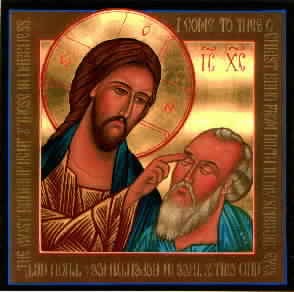First Reading — Jeremiah 31:7-9
 7 For thus says the Lord:
“Sing aloud with gladness for Jacob, and raise shouts for the chief
of the nations; proclaim, give praise, and say, ‘The Lord has saved
his people, the remnant of Israel.’ 8 Behold, I will
bring them from the north country, and gather them from the farthest
parts of the earth, among them the blind and the lame, the woman with
child and her who is in travail, together; a great company, they
shall return here. 9 With weeping they shall come, and
with consolations I will lead them back, I will make them walk by
brooks of water, in a straight path in which they shall not stumble;
for I am a father to Israel, and Ephraim is my first-born.
7 For thus says the Lord:
“Sing aloud with gladness for Jacob, and raise shouts for the chief
of the nations; proclaim, give praise, and say, ‘The Lord has saved
his people, the remnant of Israel.’ 8 Behold, I will
bring them from the north country, and gather them from the farthest
parts of the earth, among them the blind and the lame, the woman with
child and her who is in travail, together; a great company, they
shall return here. 9 With weeping they shall come, and
with consolations I will lead them back, I will make them walk by
brooks of water, in a straight path in which they shall not stumble;
for I am a father to Israel, and Ephraim is my first-born.- How do you feel these Israelites should respond to God?
- What can we learn from this passage?
- This reading is about God’s promise to console and deliver his people. They were a remnant in the land of the north, blind and lame, and they departed in tears. Pope Francis said new policies and new forms of social consensus are needed to eliminate new global forms of slavery, born of grave injustices. What does/can your parish or office or family do to fight the poverty?
How much progress has been made in this area in so many parts of the world! How much has been done in these first years of the third millennium to raise people out of extreme poverty! I know that you share my conviction that much more still needs to be done, and that in times of crisis and economic hardship a spirit of global solidarity must not be lost. At the same time I would encourage you to keep in mind all those people around us who are trapped in a cycle of poverty.4. Is there anyone in your life who just needs the road “leveled out” a little? If you help, how is this good for you as well as that person? Does self-giving help bring about the reign of God?
Second
Reading — Hebrews 5:1-6
 1 For every high priest
chosen from among men is appointed to act on behalf of men in
relation to God, to offer gifts and sacrifices for sins. 2 He
can deal gently with the ignorant and wayward, since he himself is
beset with weakness. 3 Because of this he is bound to
offer sacrifice for his own sins as well as for those of the people.
4 And one does not take the honor upon himself, but he is
called by God, just as Aaron was. 5 So also Christ did not
exalt himself to be made a high priest, but was appointed by him who
said to him, “Thou art my Son, today I have begotten thee”; 6
as he says also in another place, “Thou art a priest forever,
after the order of Melchizedek.”
1 For every high priest
chosen from among men is appointed to act on behalf of men in
relation to God, to offer gifts and sacrifices for sins. 2 He
can deal gently with the ignorant and wayward, since he himself is
beset with weakness. 3 Because of this he is bound to
offer sacrifice for his own sins as well as for those of the people.
4 And one does not take the honor upon himself, but he is
called by God, just as Aaron was. 5 So also Christ did not
exalt himself to be made a high priest, but was appointed by him who
said to him, “Thou art my Son, today I have begotten thee”; 6
as he says also in another place, “Thou art a priest forever,
after the order of Melchizedek.”- Why do you think God has such intense concern for the poor and needy of the world?
- How does this passage in Hebrews describe a priest’s primary role?
- “He is able to deal patiently with the ignorant and erring, for he himself is beset by weakness.” How would the experience of weakness help someone minister to others? Do you think Jesus’ human experience and suffering draws people to him? Why?
- Baptism makes all of us ministers of the reign of God. Think about Moses, Peter, Paul, St. Augustine, St. Damien, St. Thomas Aquinas and others. Discuss how weaknesses can help make good ministers.
Gospel Reading — Mark 10:46-52
46 And they came to Jericho;
and as he was leaving Jericho with his disciples and a great
multitude, Bartimaeus, a blind beggar, the son of Timaeus, was
sitting by the roadside. 47 And when he heard that it was
Jesus of Nazareth, he began to cry out and say, “Jesus, Son of
David, have mercy on me!” 48 And many rebuked him,
telling him to be silent; but he cried out all the more, “Son of
David, have mercy on me!”
49 And
Jesus stopped and said, “Call him.” And they called the blind
man, saying to him, “Take heart; rise, he is calling you.” 50
And throwing off his mantle he sprang up and came to Jesus. 51
And Jesus said to him, “What do you want me to do for you?”
And the blind man said to him, “Master, let me receive my sight.”
52 And Jesus said to him, “Go your way; your faith has
made you well.” And immediately he received his sight and followed
him on the way.
- Besides physical blindness what signs of blindness do you see in society?
- How do you respond to other’s blindness?
- What steps would you recommend for assessing the degree of one’s own blindness?
- How can we cultivate our faith so that our petitions to Jesus are faith based?
- The disciples were trying to shut up Bartimaeus. But he kept calling out to Jesus anyway. What do you do when others tell you to keep quiet? In the history of the Church can you think of great scientists and theologians who were silenced?
- “Master, I want to see.” What is it that you want to “see” that will change your life as radically as Bartimaeus changed his? Do you recognize Christ in our midst today as Bartimaeus did? How open are you to the working of the Spirit in your life?








